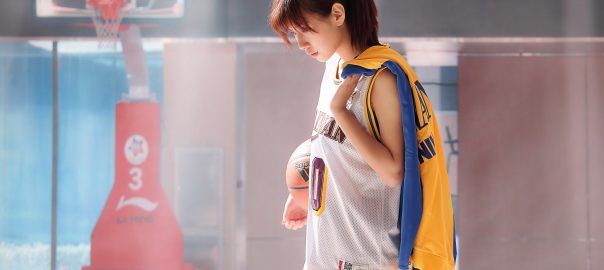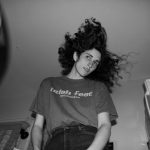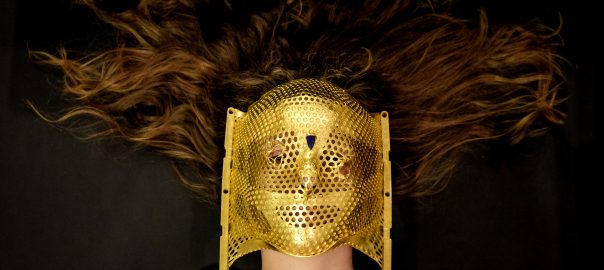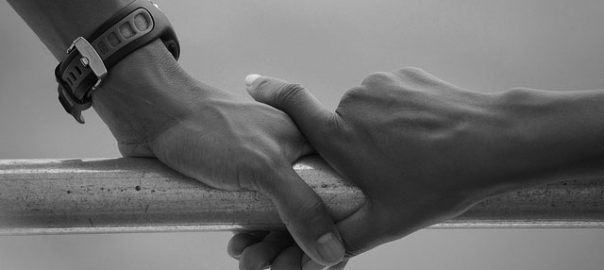Leave It At The Altar
By Jasmine Wade
Planning dates with my boyfriend Henry was always an ordeal. For one: he never showed up anywhere on time. So, a show or movie was out of the question. Two: our illnesses combined were like a herd of cows blocking the road to Normal Dateland. He suggested an action movie, a concert, and crowd watching at Fisherman’s Wharf. None of those were viable options because of my hallucinations. I suggested nachos and drinks at a local bar which he couldn’t do because of his bipolar medications and their oh so pleasant side effects.
This sort of thing was not an issue when we met. We had both been in a psychiatric hospital hidden in a wooded, secluded part of Northern California (civilization was at least 20 miles away). Paramedics wheeled me in on a stretcher. Joey stayed by my side while the nurse gave me a tour and took my bra (“The underwire is dangerous, dear”) and deodorant (“because of an incident with an alcoholic”).
Henry was the first fellow patient to talk to me. He was about my height (short for a guy, tall for a girl) and wore the same blue Cal hoodie the whole week he was hospitalized. His brown baldhead shined under the fluorescent lights. I tugged at my hair, which desperately needed a relaxer, and tried to look somewhat presentable.
“What are you in for?” he asked.
For a second, I thought about lying and saying something less stigmatized like depression or anxiety, but something about his smile made me want to be honest. “Schizoaffective disorder. Meds stopped working. You?”
“Whoa, schizoaffective. That’s schizophrenia plus bipolar, right?” He held a hand over an open mouth. I nodded. “I’m just regular old bipolar. Went off my meds.”
“Naughty boy.”
He chuckled, and the fat of his belly jiggled like it was laughing too.
That was three years ago. I’d managed to stay out of the hospital since then. Being healthy involved a balancing act between my two boyfriends: Henry and my illness. Both required respect, attention, loyalty, and tenderness. The madness was more demanding. It decided where I went, what I did, and who I did it with. If I stepped out of line, didn’t give it the attention or care it felt it deserved, I was punished with visions of pedestrians on the road where there were none or creepy crawlers on the walls, the ceiling, my skin. It was abusive but there was no breaking up, no moving away, no hiding.
But still, I dreamed of a normal boyfriend and a normal romance. That life would be like a really boring movie, but we would be enthralled with it and each other. Normal life (house, marriage, maybe a kid or two or three) was the altar, and I was the pilgrim walking many miles to get there. My illness, however, put up road blocks and detours to make the journey seem endless and the destination impossible. Henry was my golden ticket. Because he had a mental illness too, we’d be more understanding of each other and make better caretakers. He would take my life to the next level.
Joey plopped next to me on the couch. He tossed his leather jacket on the floor and flexed his chest muscles under his white tee. “Why don’t you just stay in? Order Chinese and watch a movie on Netflix.”
That’s what we always did, and I was sick of it.
“Then, go out the next morning to some public place. Like the Botanical Gardens. That shouldn’t be crowded on a weekday morning.” I stared into Joey’s eyes. The blue of his irises and the white skin of his eyelids were blurred slightly, my clue that he was a hallucination. But, in that moment, he was also kind of brilliant.
“How about we stay in tomorrow night?” I suggested to Henry. “We can order Thai and watch that World War II movie you wanted to see. I have to work the next day but the day after that, we can go to the Botanical Gardens.”
“Sounds perfect. And maybe over the weekend, we can drive up to see the Redwoods and walk along the beach.”
“I’d love that.”
“I’ll see you tomorrow at six.”
Six o’clock came and went with no Henry. I practiced pitches for the arthritis medications I sold to doctors during the day. I went over the index cards I kept in my car. Dr. Herman was a big fan of Crossfit, so I would mention the squat challenge I did the month before. Dr. LaSalle hated exercise junkies, so I would bring the double fudge cookies from the bakery she liked. Dr. Harbinger did a juice cleanse during the second week of every month, so I’d scrap the treats for that visit and bring detox tea instead. Dr. Singh’s daughter was preparing to go off to college, so I would be extra sympathetic and bring apple tarts. I went over the science behind the medication until I could pronounce all the terms perfectly.
I worked until ten o’clock and then started my nighttime routine: meds, bedtime yoga positions, herbal tea, and a book. I curled under my covers and tried to focus on the words on the page and not my irritation that Henry didn’t show up. (I was really looking forward to sexy time.) Part of me was used to it. He was a freelance photographer. When he was healthy, he traveled the world taking photos. When he wasn’t, he stayed at his mom’s house in Oakland. I didn’t know if it was his personality or his job, but he had this idea that he could sweep in and out of my life whenever he pleased. It upset me, and it upset my other boyfriend, the madness, who needed a predictable routine to lull it into dormancy.
As the meds and tea began to work their sleepy time magic, statistics ran through my mind. An old psychiatrist once told me, sixty percent of schizo-types functioned at a diminished capacity. They were greeters at grocery stores and had family or the state taking care of them. Ten percent were institutionalized, unable to leave hospitals without a judge’s approval. Ten percent were dead at their own hands. And twenty percent were out and about, holding down jobs and attempting to blend into mainstream society. I was one of the fortunate twenty percent, but that wasn’t guaranteed to last for the rest of my life. If I messed up badly enough, I could have another psychotic break and get knocked down to diminished status. I’d gone over these statistics a million times.
Similar racial statistics and their accompanying mantras—Talented Tenth, twice as good—were the rope at the end of a finish line that kept moving. And yet, I kept trying.
At three ‘o clock in the morning, loud booming knocks hit my front door with an impatience I could feel under my covers.
“Someone’s at the door, sugar pie,” Joey said. He stretched his legs from the papasan chair in the corner of my bedroom, as if he was also waking up.
I paused for a second, thinking maybe the knocks weren’t real. I froze, my head just an inch away from the satin pillowcase. The knocks came again, so loud and impatient I was sure the neighbors would wake. The cold air hit my feet first when I threw the blankets off of my body. Something’s wrong, I thought. As I walked to the front door, images of fires, earthquakes, freak tornadoes in San Francisco whirled through my mind. I imagined the end of the world. (Assassins also entered my mind for an instant, but what assassin rings the doorbell?)
I peeked through the peephole and flung the door open when I saw who it was. “Henry? What are you doing here?”
I took a good look at him. His eyes drooped, and he wasn’t moving like himself. He seemed slower, heavier.
“My mom kicked me out.” His voice trembled. “We had another fight. She said she’s tired of playing caretaker or some nonsense. She’s too old or whatever. I’m too much or something. I don’t really want to talk about it.” He sniffed.
“So…” The unspoken question hung in the air. I needed him to ask me, especially when I saw the two large suitcases and duffel bag sitting on my porch.
“Can I stay here for a few days? Just until I can find some other place to rent.”
“Just a few days?” I imagined my other boyfriend roaring with rage. Moving in? It would destroy my routine. But Henry was my actual boyfriend, accompanying me to the Altar of Normal. (Plus, moving in was a super adult move, right? Definitely something normal people did.)
Henry blinked back tears. ” I’m so tired. I think I need a day to rest. Or two days. Two days to rest and then two days to find a place.”
It didn’t feel right. But what could I say except, “Okay, baby, come on in.”
He pulled his suitcase right to my bedroom, threw his stuff onto Joey’s chair, and then crawled into bed on my side.
I watched Henry fall asleep almost immediately–something I had only known men to do.
Joey zipped his leather jacket up to the middle of his chest and shoved his hands into his pockets. “You should have talked to me about this first.”
“This is what adult couples do. They move in together,” I whispered.
“He’s not like you.”
“I know him better than any other guy I’ve dated.”
Joey snorted. “Yeah, all three of them?”
“Shut up.” He was right though. I’d been on more medications than dates. (Shit, I’d been hospitalized more times than I’d had orgasms of the non-vibrating variety.)
A shadow passed on the wall as Henry rolled over. “Who are you talking to?” he mumbled. He didn’t stay awake long enough for me to answer.
I crawled into bed next to Henry and tried not to toss and turn even though I couldn’t sleep. Just when I closed my eyes and began to drift into dreamland, my alarm blared. I caught it as quickly as I could and started going through the motions of my morning routine. When I got back to my bedroom after a shorter run than usual, Henry was awake, still in bed, and staring at the ceiling.
“Come get back in bed,” he said in a pitiful, whiny voice.
“I can’t stay with you. I have to go to work.”
“Come on, play hooky.”
“No.”
I peeled off my running clothes and hopped in the shower. The water–as hot as I could stand it–beat against my skin. I had to stick to my routine. I couldn’t play hooky. The potential for chaos in my mind was so great that my world had to be as orderly as I could make it.
I stood before my closet in just my lace panties, wondering if the sight of my almost naked self would get Henry out of bed. He didn’t seem to notice. I put on my tan skirt suit and pink blouse. In the kitchen, I made a kale, strawberry, and blueberry smoothie with almonds. Half went in a travel cup, and the other half went in a glass for Henry.
“I’m leaving,” I said as I placed his glass on the end table next to him.
He mumbled something.
“Pull the blanket away from your face so I can hear you, please.” I add the please a second late.
“I feel heavy.”
“Are you depressed?”
His body moved under the blanket in what looked like a shrug. “Probably.”
“Then, you need to get up.”
I knew mental illness demanded that I do the opposite of what my brain told me to do. If my brain told me to trust what I saw, I had to be a little suspicious. Henry’s brain was telling him to sleep all day. He needed to do the opposite.
“Go for a walk,” I said. “Head down to that grocery store you like and pick up some veggies to go with dinner.”
“Goddammit, Dawn.” He kicked at me from under the covers.
I walked out of the room without saying another word. I tried to remind myself of all the things I liked about Henry. He was smart, funny, and sweet. He never showed up on time, but when he did show up, he usually had flowers or something else to make me smile. He thought it was cute that I had a flat screen TV mounted on my living room wall even though I didn’t watch TV. (I liked the way it added to the decor of the room.) I needed to be patient with him. After all, if the roles were reversed, if my madness were out to play, I would want him to be patient with me.
We were a perfect match. We would take turns playing caretaker. Give a little, get a little. I told myself this over and over as I drove to the VA Medical Center in Oakland. By the time I pulled into their parking lot, I had calmed down.
Men in wheelchairs and on canes hung out in the grassy area outside the main doors. I nodded and smiled at them as I walked in, even though my stomach twisted in knots. All the pain in their faces and their bodies made me feel like my samples of arthritis medication were insignificant. Inside the lobby, my heels clacked against the orange tile.
There was no one at reception. I looked around and a middle aged woman walked up wearing a white coat and carrying a clipboard. She was dark-skinned with a cheerful, round face. “Hello,” she said. “How may I help you?”
I held out my hand to shake hers. “I’m Dawn, a rep from Mantex Pharmaceuticals. I’m here to give some samples to Dr. Herman.”
Instinct told me to look her up and down, but instead my mind wandered to what Henry was doing. I hoped he had at least moved from the bed to the couch to watch Netflix on his laptop.
“Oh, Dr. Herman just went into a meeting with all the other doctors. I’m on my way there now. I’d be happy to drop off the samples.” She reached out her hand. “Unless you needed to talk to him?”
Henry needed to snap himself out of his depression before it got more intense. There was a way to head these things off. Didn’t he know that? Why wouldn’t he let me help him? “No, no,” I said to the woman. “I mean, talking to him would be ideal, but if he’s in a meeting, I’ll call him later and make an appointment.”
“Great. I’ll take the samples to him.” The woman stepped a little closer, her smile widened.
I stared at her for a moment longer than was appropriate. Something didn’t feel right. “Thank you,” I said as I handed her the bag. Maybe I could convince Henry to cook some comfort foods with me. Mashed potatoes. Fried chicken.
The woman took the bag and shuffled down the hall. I started to walk back through the lobby towards my car. Maybe I could convince Henry to go to a movie with me. Or sex! Sex was good for depression, right? (Although I wasn’t sure how it would impact his man parts.)
Just before I walked back out the front doors of the clinic, I looked over my shoulder at the woman who took the samples. Damn, I should have gotten her name. New doctor meant new contact and new index card. I was off my game. She was pretty far away, but her shoes looked awfully comfortable, like slippers. I stared at her feet as they moved farther and farther down the hallway. She was probably wearing some comfortable brand of loafers.
Back in my car, I pulled out of the clinic parking lot. As I approached a red light, a green hatchback appeared in front of me. I slammed on the breaks wondering where the hell the car came from. The silver car behind me laid on the horn. I glanced in the rearview mirror. “Sorry, sorry, sorry,” I muttered. When I looked back in front of me, a second later, the green car was gone. I looked in all the lanes–no green car. The light was still red. Down the streets, back in the rearview mirror–no green car. I froze. The light turned green, and I didn’t move.
The green car was a hallucination. Not too bad, it happened from time to time. But it got me wondering about the woman at the clinic. Was the clipboard she was holding a little blurry? Was the white coat slightly out of focus? Who did I give the samples to?
“You should go back and check,” Joey said from the backseat.
“No, that would make things worse.”
“You gotta do something to cover your ass.”
The silver car honked again, and the world came back into focus. I moved through the intersection just as the light turned yellow.
I debated going back, but it would be worse for me to go back and admit I gave samples to a hallucination, right? Instead, maybe no one would even know I was there, and I could schedule an actual appointment with Dr. Herman. Or maybe I could say I gave them to an orderly whose name I didn’t catch. Either way, I had options.
I was about to go pick up some food to take to the next doctor on my list, but I realized I left the other packs of samples at home. I sped back and ran up the driveway as fast as I could in heels. I prayed Henry was at least sitting up.
I didn’t notice the blood at first. I tracked it halfway down the hallway before I noticed my shoes were sticking to the floor. I turned around and almost screamed at the sight of bloody footsteps. I recognized my small shoe-shaped prints in the blood, but there were larger prints with red toes on my hardwood floor.
“Henry?” I followed the bloody toes through the hallway to the entrance of my bedroom. The door was closed.
Joey breathed on my neck. He reached his white hand toward the doorknob, and I followed with my brown hand.
The trail of blood led from the door to the bed, where Henry was a lump under the covers.
“What happened? Are you hurt?”
He poked his head out. “Everything hurts.”
“I know, baby, I know.” I sat at the foot of the bed, wishing I could see under the covers, unsure of how to get him out of his cocoon. “But there’s blood on the floor. Where are you hurt?”
“Everywhere.”
I reached up and started to pull the covers away.
Henry’s hand flew near my face and dragged the covers back. I propelled myself backward, trying not to get hit.
I passed the green smoothie, untouched, on the nightstand as I left the bedroom.
Glass crunched under my feet when I stepped into the kitchen. My mouth opened and closed as I searched for words and breath. Every dish in my cupboards was on the floor in a heap of broken glass. Blood mixed in with the shattered pieces and trailed out of the kitchen.
Joey came in behind me. The glass didn’t crunch under his feet. “This, my dear, is what we call a 5150 kind of situation.”
A 5150 involved a call to the police, who would come and investigate the situation. They would inevitably deem Henry “a danger to himself or others” and cart him off in handcuffs to the nearest hospital for a psych evaluation. He would ride in the back of the cop car, sliding around the seat with every turn, unable to brace himself because his hands would be cuffed behind his back. He would be “escorted” into the hospital, with anyone watching unable to distinguish him from a criminal. He would be forced to disrobe down to his underwear in front of the cops and bear the cold, sterile hospital air in just a gown. The cops would tell the nurses to chain him to a bed and station a guard outside the door. It was humiliating. (Believe me, I knew.) It was the sort of thing that damaged the soul, and would definitely damage a relationship. I could not convince my black self to call the cops on my black boyfriend just because he broke my dishes.
I rushed back to the bedroom. The smell of decaying fruit hung in the air. But my nose adjusted after a few seconds.
“Henry, we have to talk. Do you know what my kitchen looks like right now?”
He rolled over so he was facing my direction even though his head was still under the covers. “It was an accident.”
He accidentally broke all my dishes?
“The first one was. An accident, I mean. I’m not sure what happened after that.”
“Is there anyone I can call for you?”
“I’m between treatment teams.”
“The whole team?” We were marching into dangerous territory. No treatment team meant no therapist, no psychiatrist, no professional support.
He poked his head out. His eyes were red. “I can get better on my own. I just need time. You know how this is. Sometimes you just have to ride it out.”
The smoothie on the table had begun to separate into its different elements. The green of the kale sank to the bottom while the oil from the almonds rose to the top.
“Can I look at your feet?” I said in my sweetest voice. I tried to channel the psychiatric nurses, who have amazing abilities to get uncooperative patients to follow orders. “I want to help you.”
I pulled the comforter up from the bottom. Mental note: remake bed.
Streaks of blood dripped down the sheets and the bed skirt onto the floor. Henry’s feet were covered in blood in varying degrees of dryness. It was caked between his toes. It oozed from cuts on the balls and soles of his feet. Shards of glass jutted from at least a dozen places on each foot.
“You don’t feel this?”
“I don’t feel much of anything.”
I stopped myself from rolling my eyes. (Did he really have to be so dramatic?) Impatience returned with Joey, who sat in the chair in the corner. The smell from the sour smoothie returned, and I caught a whiff with every breath.
I needed to get the glass out of Henry’s feet before it got infected. I grabbed tweezers from the bathroom.
I pushed the tweezers into his skin on either side of a shard of glass and pulled. The tweezers screeched against the glass, like nails on a chalkboard, but it didn’t move. I moved to a bigger piece. Slowly, the glass separated from flesh. A trickle of blood flowed from the open wound.
Joey had moved a little closer. “Hmm. Gauze?”
The blood dripped onto the sheets and then onto the floor. Mental note: clean floor.
I ran out of the room, slamming the door behind me, and sprinted toward the kitchen. I tiptoed over the glass, grabbed my first aid kit and my hot pink toolbox from under the sink, and ran back to the room.
The stink of the smoothie smacked me in the face when I opened the door, but I didn’t stop. The kale had separated from the red and blue of the berries. I’d never been more disgusted by the color green. The bedroom felt like it had shrunk to half its original size.
My heart pounded. In the back of my mind, I heard my therapist telling me to slow down, take a break, relieve some of the stress. But I couldn’t. Henry needed me to get the glass out of his feet.
My phone rang. I panicked, knowing it was work. They were undoubtedly wondering why I had missed the rest of my meetings. Or maybe it was about the VA Center. Nausea turned my stomach (the smell plus anxiety was a bad gastrointestinal mix).
I focused with a set of hot pink pliers on one of the small pieces near the ball of Henry’s top foot. My hands shook too much to get a good grip. My brain felt like it was swelling, pressing against the edges of my skull. I was getting overloaded. I leaned back, shook my head, and felt a drop from the ceiling land right on my forehead. Just as I looked up to see where it came from, another drop hit my eye. I wiped my eye and saw paint swirling around on the ceiling, as if a large child had finger painted up there. The greens swirled with the blues and reds. Drops of paint fell and landed on me, dotting my tan suit jacket.
The pressure in my brain intensified. I took a deep breath and peeled my suit jacket off and tried to concentrate on Henry’s feet. My madness was awake and roaring. I’d upset the delicate balance of my brain chemistry. My illness collided with Henry’s in my tiny bedroom, and it was hard to breathe. I knew I needed to take a step back, let my brain heal, keep from going too far, and prevent getting knocked down to diminished status. I would rest after I handled Henry’s feet.
I pulled out a couple more shards of glass and glanced over at the untouched smoothie. The kale seemed darker, like it was rotting. My stomach heaved.
I extracted piece after piece of glass out of Henry’s right foot. The sheets would be soiled forever. Mental note: Toss sheets.
I pulled and plucked until there was just one shard left. It was tiny and hidden right in the soft tissue of his arch. I leaned forward, gripping his ankle with one hand. My face was just inches away from the glass, which was getting harder to see as the sun began to set. I pushed the points of the pliers into Henry’s foot and didn’t grab the glass the first time around. It was like those carnival games with the claw and some nice, shiny, unattainable toy sitting in the bin. Henry groaned. I pushed the pliers back in. Henry screamed, jerked his foot up, and kicked me right in the face.
I fell off the bed, stunned. I felt my face. The glass left in his foot had scratched my cheeks, chin, and nose. I couldn’t tell my blood from Henry’s blood from the “paint” on the ceiling.
Joey crouched in front of me. Neither of us said anything for awhile.
My cell phone rang again. It was my boss Larry’s special ring tone. I wondered if it was about the VA Center.
How was this my life? Covered in blood, sitting on the floor of my bedroom with a sick man who doesn’t seem to want to do anything to make himself better. And all my dishes were broken. Mental note: buy new dishes.
“This isn’t working,” I told Joey.
Joey tapped his thigh. “You’re already in relationships.”
He was right. I was stuck in the miserable relationship with my illness. Henry had his own extra girlfriend. Maybe we couldn’t all be in the bed together. There wasn’t enough room. The road to the Altar of Normal had cracked, bent, warped and it felt like my brain was following suit.
Henry and I couldn’t be together anymore. A familiar ache—loneliness, fear—grew in my chest. I had planned out the whole normal life with Henry (house, marriage, kids, dogs). The collapse of the plan ushered in a panic that my life would never be what I wanted, that I would never have someone, that my madness would always be my closest companion.
“Focus,” Joey commanded.
And so, I did.
Mental notes: Call Larry and tell him I took a sick day. Call Dr. Herman and make an appointment. Get the glass out of Henry’s other foot. Make dinner. Buy more kale.
Throw away the smoothie.
The smell assaulted my nose as soon as my thoughts turned to the smoothie. I grabbed it and stomped toward the kitchen. I forgot about the broken glass and winced when I stepped on it. The glass fell out of my hand and smashed against the tile. The green liquid mixed with the red and white checkers of my kitchen floor.
Clean up the smoothie. Take the sheets of the bed. Clean up the glass in the kitchen. Get the blood out of the rug in the bedroom.
My phone ran again. Larry was calling.
I wanted to scream. I opened my mouth and the walls of the kitchen bent inward. I closed my mouth and the walls bounced back to their original place. I blinked once and then again, harder.
“I’m done,” I said aloud.
Trembling, I found my cell phone in my briefcase by the front door. I went to my living room and curled my feet under me on the couch. I dialed 911.
“Hello? Yes, I would like to…I need a…” My breath caught in my throat, and the tears started to come. “My friend…” He’d been reduced to that. He was no longer lover, boyfriend, hopes for normalcy, plans for a good life, golden ticket. “My friend is bipolar, and I can’t help him. Can you send someone?”
____________
Jasmine Wade
is a fiction writer.
jasminewade.com
Jasmine Wade is obsessed with the ridiculous, and oftentimes traumatic, trials of growing  up. Her short stories have appeared in Drunken Boat, TAYO Literary Magazine, Lunch Ticket, The Copperfield Review and others. She is an alumna of VONA/Voices and Mills College’s MFA program. She has won the 2016 Edward P. Jones Short Story Contest and was a finalist for the Hurston/Wright Founding Members Award for College Writers. When she’s not writing, she’s usually buying or reading more used books than she has space.
up. Her short stories have appeared in Drunken Boat, TAYO Literary Magazine, Lunch Ticket, The Copperfield Review and others. She is an alumna of VONA/Voices and Mills College’s MFA program. She has won the 2016 Edward P. Jones Short Story Contest and was a finalist for the Hurston/Wright Founding Members Award for College Writers. When she’s not writing, she’s usually buying or reading more used books than she has space.

 She is committed to writing thought-provoking creative non-fiction, fiction, and poetry. Publications include two book-length memoirs: Through Eyes Like Mine and Overdue Apologies, and excerpts, essays, and poetry in Lady Liberty Lit, Catapult, Meridian, Compose, Kartika, Hippocampus, The Rising Phoenix Review, and Linden Avenue.
She is committed to writing thought-provoking creative non-fiction, fiction, and poetry. Publications include two book-length memoirs: Through Eyes Like Mine and Overdue Apologies, and excerpts, essays, and poetry in Lady Liberty Lit, Catapult, Meridian, Compose, Kartika, Hippocampus, The Rising Phoenix Review, and Linden Avenue.















